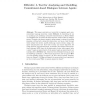Free Online Productivity Tools
i2Speak
i2Symbol
i2OCR
iTex2Img
iWeb2Print
iWeb2Shot
i2Type
iPdf2Split
iPdf2Merge
i2Bopomofo
i2Arabic
i2Style
i2Image
i2PDF
iLatex2Rtf
Sci2ools
113
click to vote
AI
2003
Springer
2003
Springer
DIAGAL: A Tool for Analyzing and Modelling Commitment-Based Dialogues between Agents
Abstract. This paper overviews our currently in progress agent communication language simulator, called DIAGAL, by describing its use in analyzing and modelling automated conversations in offices. Offices are modelled here as systems of communicative action based on dialogue games. Through such games, people in office engage in actions by making promises, stating facts, asking for information, and so on. And through these actions they create, modify, discharge, cancel, release, assign, delegate commitments that bind their current and future behaviors. To make apparent such commitments, we consider here Agent Communication Language (ACL) from the dialectic point of view, where agents “play a game” based on commitments. Such games based on commitments are incorporated in DIAGAL tool, which has been developed having in mind the following questions: (1) What kind of structure has the game? How are rules specified within the game?; (2) What kind of games’ compositions are allowed?; (...
Agent Communication Language | AI 2003 | Artificial Intelligence | Delegate Commitments | Progress Agent Communication |
| Added | 06 Jul 2010 |
| Updated | 06 Jul 2010 |
| Type | Conference |
| Year | 2003 |
| Where | AI |
| Authors | Marc-André Labrie, Brahim Chaib-draa, Nicolas Maudet |
Comments (0)

